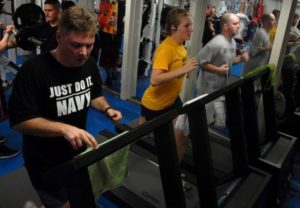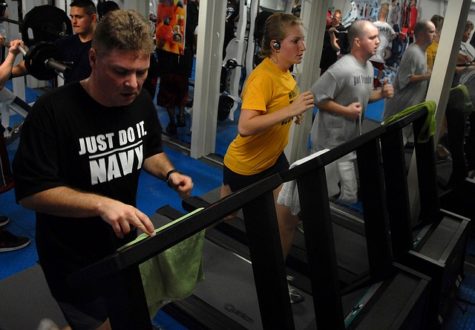LONDON, Ontario — For students struggling to focus on that term paper or office workers who need an extra creative boost when tackling a difficult project, a new study finds that a 10-minute burst of exercise can provide a quick mental jumpstart to get the brainwaves moving.
Researchers at Western University in Canada recruited a group of healthy young adults to do one of two activities: either sit down and read a magazine for 10 minutes, or pedal at a moderate-to-vigorous pace on an exercise bike for the same length of time.

After completing their tasks, participants were hooked up to eye-tracking devices that logged the their reaction times during a challenging eye movement task. The task tapped into the frontal lobe of the brain, an area known for overseeing executive functions like problem solving, decision making, and judgment.
“Those who had exercised showed immediate improvement. Their responses were more accurate and their reaction times were up to 50 milliseconds shorter than their pre-exercise values. That may seem minuscule but it represented a 14-per-cent gain in cognitive performance in some instances,” says study co-author Matthew Heath, a kinesiology professor and supervisor in the university’s graduate program for neuroscience, in a news release.
In other words, Heath says that the results showed that just 10 minutes of aerobic exercise can provide a significant spark for the brain — enough to help people focus and perform better on challenging assignments.
“I always tell my students before they write a test or an exam or go into an interview — or do anything that is cognitively demanding – they should get some exercise first,” he adds. “Our study shows the brain’s networks like it. They perform better.”
The researchers hope that in addition to being useful for students or workers, the results may also benefit less mobile elderly adults battling dementia or similar conditions.
“Some people can’t commit to a long-term exercise regime because of time or physical capacity. This shows that people can cycle or walk briskly for a short duration, even once, and find immediate benefits,” he says.
If you’re wondering how long the mental burst lasts, Heath is now working on a new experiment to answer that very question.
The results for his completed study were published in the Jan. 2018 edition of the journal Neuropsychologia.

Petals are modified leaves that surround the
reproductive parts of flowers. They are often brightly colored or
unusually shaped to attract pollinators. Together, all of the petals of a flower are called a corolla. Petals are usually accompanied by another set of special leaves called sepals, that collectively form the calyx and lie …
Everybody’s a critic.
You’re describing a vagina you know….just sayin…
I doubt that even 10 minutes of exercise is required. Just a couple of minutes will increase oxygen levels.
I used to get sooo sleepy every afternoon at work. Finally discovered a walk up and down the hall, a couple of times, and I was refreshed. Ten minutes of exercise would wear me out and I’d definitely need a nap after that.
exercise helps brains…. who would’ve thunk….
Is rubbing one out considered exercise? Cause I’m way ahead of the curve in memory function.
Stop wasting your sperm. Your boyfriend will love you more if you give it to him.
I usually “waste it” on my wife’s ample chest…and I have vids and pics to chronicle it
Diversity, mass immigration, open borders, is demanded Only wherever white people live
“Diversity is a strength” really says “White people are a weakness”
Its White Geno Cide
Its Anti White
Exercise pays off in the future, procrastination pays off now.
I don’t know, I had to ride my bike half a mile to take a 3 or 4-hour licensure test (because cars were parked that far away), and by the time I got in and situated, it was hard to sit and get my heart-rate down. i did well on the test, but it had me very hyped up during the exam for about a half of an hour.